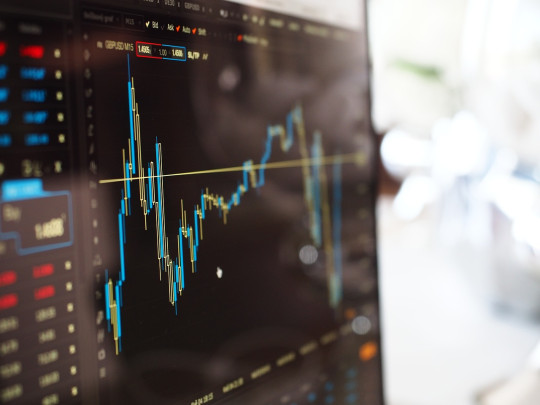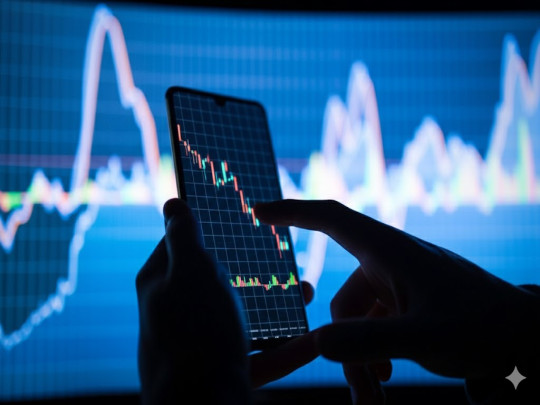Market Update: Geopolitical Tensions Rattle Stocks, Boost Gold, Oil, and Defense Plays
Nvidia leads U.S. equities higher as AI optimism fuels tech momentum. Dollar General jumps on strong guidance, while HPE, Thor, and Wells Fargo rally on earnings and regulatory shifts. Gold firms on trade fears, oil steadies, and Bitcoin stays flat. All eyes on upcoming U.S. jobs data and Fed's Beige Book.

- Early Monday US stock futures edged higher, signaling a tentative rebound as markets stabilized following Friday's sharp sell-off, which was triggered by Israel's airstrikes on Iran.
- This follows a volatile Friday that saw markets tumble (Dow -770 pts), dragging indices to weekly losses as investors fled tech for perceived safety in oil and defense stocks.
- The Israel-Iran conflict entered its fourth day Monday, with reports of fresh attacks on energy infrastructure and an Iranian threat to close the Strait of Hormuz, keeping markets on edge.
- Notable premarket movers Monday included U.S. Steel (+5%) jumping after Trump approved its merger with Nippon Steel. EchoStar (+40%) soared on reports of presidential intervention in a spectrum dispute. Sage Therapeutics (+35%) surged on an acquisition deal. Sarepta (-37%) plunged after a second patient death in a gene therapy trial. Roku (+8.5%) gained on an Amazon partnership.
- Key economic data showed China's May retail sales rose a better-than-expected 6.4% YoY. G7 leaders are meeting amid escalating Middle East tensions.
- Company news included U.S. Steel and Nippon Steel signing a national security agreement with the US, clearing their merger. Eli Lilly announced it will offer higher-dose versions of its Zepbound weight-loss drug directly to consumers.
- Global markets Monday saw Europe open slightly higher, led by banks and energy stocks. Asia mostly gained, buoyed by strong Chinese retail sales data despite geopolitical jitters.
- US Treasury yields edged slightly higher Monday morning (10-year around 4.44%) as markets continued to price in geopolitical risk.
- Gold prices eased Monday as some initial panic subsided. Oil prices also pulled back slightly from Friday's 7% surge after key infrastructure remained intact over the weekend, but prices remain elevated. Bitcoin saw a modest rebound.
- Market sentiment remains cautious, with investors focused on the Israel-Iran conflict and its impact on oil, the G7 summit's response, and the upcoming Federal Reserve interest rate decision on Wednesday.
Israel’s airstrikes on Iran Friday triggered a wave of volatility across global financial markets. Oil prices surged on concerns that supply could be disrupted from Iran, which ranked as the world’s ninth-largest oil producer in 2023. At the same time, gold prices rose as investors sought safety in the traditional crisis hedge. The precious metal is often viewed as a store of value that maintains stability during periods of geopolitical tension or inflationary shock. Conversely, equities—typically viewed as risk assets—fell broadly across international markets in response to the sudden escalation.
Despite Friday’s market turmoil, U.S. futures edged higher on Monday. Gold prices and the dollar index dipped, signaling that investor sentiment may be stabilizing after the initial panic. Early Monday gains in stock futures suggested a tentative rebound, as fears surrounding oil price spikes began to subside. Still, caution prevailed, with many traders wary of the broader implications of escalating Middle East tensions on the global economy.
Friday’s sell-off saw the Dow Jones Industrial Average plummet more than 700 points, with all three major indexes falling by over 1% on the day. The declines dragged weekly performance into negative territory. The Dow ended the week down 1.3%, while the S&P 500 slipped 0.4% and the Nasdaq Composite fell 0.6%. The sharp reversal underscored investor sensitivity to geopolitical developments and their potential to derail market momentum.
US Market Previous Day:
The Dow Jones Industrial Average tumbled 769.83 points, or 1.79%, to close at 42,197.79. The S&P 500 declined 1.13% to end the session at 5,976.97, while the Nasdaq Composite dropped 1.30%, finishing at 19,406.83.
The pullback was led by a sharp retreat in high-growth technology names, including Nvidia, which had been among the top drivers of the market’s rally from the April lows. Investors rotated out of riskier assets amid heightened geopolitical tension, opting instead for more defensive sectors.
Oil and defense stocks outperformed. Shares of Exxon Mobil rose 2%, while Lockheed Martin and RTX each gained more than 3%, reflecting a flight to perceived safety and rising demand for defense exposure. The market’s downturn began Thursday evening after Israeli Defense Minister Israel Katz declared a special state of emergency following a strike on Iran. Two U.S. officials later confirmed that the United States had no involvement or assistance in the Israeli military action, according to a report from NBC News.
US Futures in Green:
- Dow Jones Industrial Average futures rose by 1.38%
- S&P 500 futures meagre gains of 1.56%
- Nasdaq Composite futures lead the pack with gains of 1.83%
Biggest Premarket Movers
- U.S. Steel: Shares jumped 5% after President Donald Trump issued an executive order on Friday that approved the company's merger with Japan’s Nippon Steel. The deal includes a national security agreement that provides a "golden share" to the U.S. government, which President Trump stated gives him "total control" over the entity.
- Roku: The streaming platform jumped 8.5% after announcing an exclusive partnership with Amazon. The agreement provides advertisers access to what the companies are calling “the largest authenticated footprint in connected TV,” enabling them to reach approximately 80 million U.S. households through the Amazon platform.
- Advanced Micro Devices: The chipmaker added more than 2% after receiving a price target increase from Piper Sandler. Following AMD's recent pre-quarter close call, Piper expressed expectations that the company's AI business will surge after the third quarter and noted increased investor confidence regarding a key hyperscaler client.
- EchoStar: The satellite company's stock jumped more than 40%. The significant rally followed a Bloomberg News report that President Donald Trump had urged the head of the Federal Communications Commission (FCC) to resolve a spectrum dispute with the company, which had previously threatened to file for bankruptcy protection.
- Celsius: Shares of the energy drink company rallied about 4% after TD Cowen upgraded the stock to "buy" from "hold." The investment firm noted that Celsius's "growth story is heating back up" and expressed confidence in the brand, the integration of its Alani Nu acquisition, and its potential for wider distribution next year.
- Victoria’s Secret: Shares added 3% following a Wall Street Journal report that activist investor Barrington Capital Group has accumulated a stake in the lingerie retailer. Barrington reportedly plans to push for an overhaul of the company's board and a refocus of its business strategy.
- Sage Therapeutics: Sage soared 35% after the company agreed to be acquired by Supernus Pharmaceuticals in a deal valued at $12 per share, or approximately $795 million. The acquisition will add Sage's FDA-approved postpartum depression drug, Zurzuvae, to the Supernus portfolio.
- Sarepta Therapeutics: The biopharmaceutical company plunged more than 37% after reporting the death of a second patient who was receiving its Elevidys gene therapy for Duchenne muscular dystrophy. In response, Sarepta has halted shipments of Elevidys and is implementing new safety measures for non-ambulatory patients.
Israel-Iran War
The armed conflict between Israel and Iran has entered its fourth consecutive day, with both nations launching fresh attacks on Monday. The escalation began early Friday when Israel reportedly struck Iranian nuclear facilities, prompting Iran to retaliate with more than 100 drone strikes targeting Israeli territory. Since then, hostilities have intensified, with each side now reportedly targeting key energy infrastructure, raising the stakes for the global economy.
Iran has threatened to shut the Strait of Hormuz, a vital chokepoint for the global oil supply, through which roughly 20% of the world’s petroleum passes. This move could severely disrupt energy markets and has added to already heightened investor anxiety.
Israel, meanwhile, claimed to have achieved "aerial superiority" over Iranian skies. A military spokesperson suggested the country is prepared to “make Iran pay” for its latest missile barrage, which reportedly hit Tel Aviv, Jerusalem, and the Haifa refinery, though the extent of the damage remains unconfirmed. Iranian forces claimed to have deployed “innovative methods” that disrupted Israeli air defenses — reportedly leading to incidents of Israel’s own Iron Dome systems misfiring.
Markets are bracing for more volatility. Oil prices surged on initial reports of the attacks, and though gains have since moderated, energy traders remain on high alert. The conflict’s focus on energy assets — combined with speculation about Hormuz’s closure — could inject fresh upside pressure on crude prices, with spillover effects across inflation, central bank policy, and corporate margins.
Key Economic Data/News:
The leaders of the G7 — the U.S., U.K., France, Germany, Italy, Canada, and Japan — have convened in the Canadian Rockies for a high-stakes summit. The agenda, already packed with items including Ukraine, China, and global inflation, now must contend with a rapidly evolving Middle East crisis. Analysts say the summit may struggle to present a unified front, given President Trump’s unpredictable trade posture — including tariffs imposed on all G7 partners during his current term. “Coordination on global issues would be easier if the U.S. weren’t imposing tariffs on its allies,” said John Lipsky of the Atlantic Council.
Amid the uncertainty, China’s retail sales in May rose 6.4% year-over-year, beating expectations for a 5% increase. The data, released Monday by the National Bureau of Statistics, represents an acceleration from April’s 5.1% growth and signals resilient domestic consumption. NBS spokesperson Linghui Fu credited the rise to China’s consumer goods trade-in program, aimed at boosting household demand. Stronger-than-expected Chinese consumption could offer a tailwind to global growth, especially if supply-side pressures from the Middle East continue to mount.
Earnings Season/Company News:
Shares of U.S. Steel surged on Monday following President Donald Trump’s approval of its contested merger with Japan’s Nippon Steel. The stock rose about 5% in premarket trading after Trump signed an executive order on Friday that allowed the deal to proceed, contingent on the companies signing a national security agreement with the U.S. government. Both U.S. Steel and Nippon confirmed that the agreement had been signed, clearing the final hurdle for the merger.
As part of the deal, U.S. Steel disclosed that the national security agreement includes a “golden share” for the U.S. government, though specific powers linked to the share were not detailed. President Trump later stated that the golden share grants the U.S. president “total control.” In general, golden shares give holders veto authority over key corporate decisions. Pennsylvania Senator Dave McCormick previously noted that the arrangement will give the government control over multiple board seats and safeguard domestic production levels from being cut.
In healthcare news, Eli Lilly announced that it will begin offering higher-dose versions of its widely used weight-loss drug Zepbound on its online platform, LillyDirect. The 12.5 mg and 15 mg doses will be priced at $499 per month and become available for shipping to self-paying patients starting in early August. Healthcare providers can begin prescribing the higher-dose vials from July 7, the company said.
Global Market Trends:
European markets showed a mixed but slightly positive tone on Monday, with the Stoxx 600 index rising 0.33%. Gains were led by bank stocks, which climbed 1.3%, and oil and gas names, up 1.18%, as investors digested the fallout from the intensifying Israel-Iran conflict. The surge in crude oil prices reignited inflation worries, pushing investors toward energy-related names. On the downside, the healthcare sector fell 0.7%, and food and beverage stocks declined 0.5%.
In Asia-Pacific, markets posted solid gains as investors assessed the growing geopolitical tensions and processed fresh economic data out of China. Mainland China’s CSI 300 index added 0.25% to finish at 3,873.80, while the Hang Seng Index in Hong Kong rose 0.7% to 24,060.99. Japan’s Nikkei 225 advanced 1.26% to close at 38,311.33, and the Topix index gained 0.75% to 2,777.13. South Korea’s Kospi jumped 1.8% to 2,946.66, and the small-cap Kosdaq climbed 1.09% to 777.26. Australia’s S&P/ASX 200, however, ended the session flat at 8,548.40.
Debt Market:
U.S. Treasury yields edged higher on Monday, reflecting ongoing geopolitical risks stemming from deadly air strikes between Israel and Iran. The 2-year Treasury yield increased slightly, rising more than 1 basis point to 3.971%. The benchmark 10-year yield also moved up by a similar margin to 4.44%. This follows a more pronounced spike in yields on Friday, when Israel’s strikes on Iran rattled global markets, driving up demand for yield and pricing in higher geopolitical risk premiums.
Commodities and Other Assets:
Gold prices retreated on Monday as markets continued to process the Israel-Iran conflict and shifted attention to upcoming macroeconomic events, including the Group of Seven (G7) summit and the U.S. Federal Reserve’s interest rate decision later this week. While gold initially found support from geopolitical tensions, the prospect of stable or even lower interest rates from the Fed provides a potential floor for prices. Gold typically performs well during periods of uncertainty and in low-rate environments, reinforcing its role as a safe-haven asset.
Oil prices pulled back slightly on Monday, after posting a dramatic 7% surge on Friday. Weekend military activity between Israel and Iran failed to impact key oil infrastructure, prompting a modest unwinding of gains. Still, both Brent and WTI crude benchmarks remain elevated, with Friday’s session marking their highest levels since January. A central focus remains the Strait of Hormuz — a critical chokepoint through which approximately 20% of global oil supply passes. Although Iran’s current oil production (~3.3 million bpd) and exports (>2 million bpd) have not yet been disrupted, any sign of sustained conflict or threats to shipping through the strait could sharply lift prices. Analysts suggest that while OPEC+ has enough spare capacity to cover an Iranian supply gap, any actual disruption would likely jolt prices higher in the short term.
Bitcoin rebounded slightly on Monday after briefly falling to a one-week low amid the weekend’s escalation in Middle East tensions. Broader crypto markets mirrored the recovery in Bitcoin, but sentiment remained fragile. As a high-beta risk asset, crypto tends to be more sensitive to geopolitical headlines and shifts in investor sentiment. With no clear signs of deescalation between Israel and Iran, cryptocurrencies could remain volatile and on the defensive through the week.
Market Sentiment:
Investors are also looking ahead to key U.S. manufacturing survey data and, more importantly, the Federal Reserve’s interest rate decision due Wednesday. According to the CME FedWatch Tool, futures markets are pricing in a 97% probability that the Fed will hold rates steady — despite renewed pressure from President Donald Trump calling for rate cuts. However, the recent spike in oil prices has tempered rate-cut expectations, as central bankers weigh the risk of inflation reacceleration against slowing economic growth. Markets will be closely watching Fed Chair Jerome Powell’s remarks for clues on the path of future policy.



